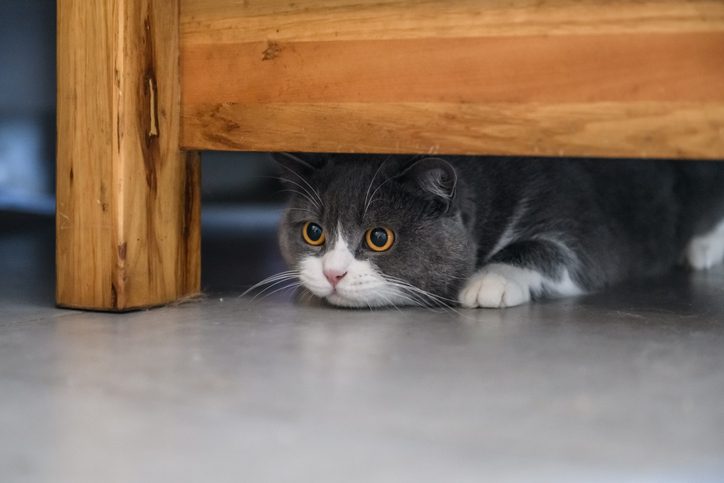If you’re a cat owner, you’ve probably noticed hiding behavior in your cat every now and then. Different types of hiding behavior may indicate different issues for your pet, and it’s important to learn how to recognize the various reasons why your cat may be hiding.
In the article below, you’ll find a quick list of more information to help you get a better idea of what’s going on with your cat. With the help of this guide, you can narrow down the potential issues with your pet and get started helping them feel better soon.

1. Pain
Pain is the most common cause of hiding in cats. Almost any time a cat is in pain, they will hide away from humans and other animals in the home too. This is often because they don’t want anyone to touch them and cause more pain.
If your cat has been injured and is hiding, you should take them to the veterinarian. If your cat is hiding and you’re unsure if they are hurt or not, gently remove them from the hiding place to check them out thoroughly and go to the vet if you feel it is necessary.
2. Illness
If a cat is sick, they may hide until they feel better. The downside of this behavior is that it can be very difficult to locate a sick cat to take them to the vet. If your cat has been hiding for more than a day and shows other symptoms of being sick, don’t wait to take them in to be examined.
On the other hand, if you know your cat has a chronic health problem and they hide often because of this issue, you may not have to visit the vet every time they start hiding.
3. Fear and Anxiety
Cats run and hide under the bed when something startles them, and this fear response is completely normal. If your cat comes back out from the hiding spot as soon as the cause of the fear has passed, then you don’t typically have to worry about this type of hiding.
If, however, your cat has severe anxiety that doesn’t seem to get better with time, they may need to be put on an anxiety medication from the vet. This type of medication may help very anxious cats calm down and feel better when they are faced with situations that increase their anxiety and fear levels.
4. Pregnancy
If you have a female cat who has not been spayed, it is possible that she’s hiding because she is pregnant. And if you have a cat who you know is pregnant already, hiding behavior may indicate that it’s almost time for her kittens to come.
It is a good idea to give your pregnant cat a safe space to call her own, away from the other human and animal members of the family. This way, she will have a comfortable place to have her kittens when the time comes.
5. Old Age
As cats age, they become more and more likely to hide for most or all day, only coming out to eat or go to the litter box. This is an unfortunate but normal sign of cats nearing the end of their lives.
Cats typically have an instinctive need to protect their “families,” which means they don’t want to be around their human family members when they are old and near death. You may be able to encourage your aging cat to come out of hiding, but they may be more comfortable staying tucked away, too.
6. Playing
The most benign reason why your cat may be hiding is because they are playing. Although a playing cat and a sick or aging cat look different, it can be hard to tell if you’re a new cat owner.
If your cat is hiding for short periods of time and then bursting out of a hiding spot to pounce on you or a toy, then this is playful activity and is nothing to worry about. This type of hiding and pouncing or chasing behavior is all part of being a cat!
Northern Pike Veterinary Hospital is Here for You
Although hiding behavior isn’t always a cause for concern, it typically indicates that something isn’t quite right with your pet. By learning your cat’s regular routine and behavior as well as the potential underlying causes of hiding in cats, you can more easily recognize when something is going wrong for your pet.
If you do suspect your cat is hiding due to a problem, call your Northern Pike Veterinary Hospital vet at 412-373-8580 for more information. Your vet can help you narrow down the issue and choose the right treatment or management solution for your cat moving forward. Additionally, your vet can let you know if your cat’s hiding behavior is just normal feline activity, too.

